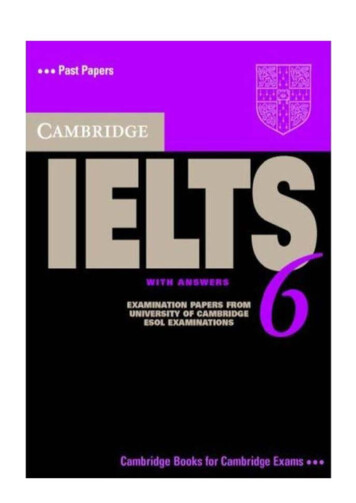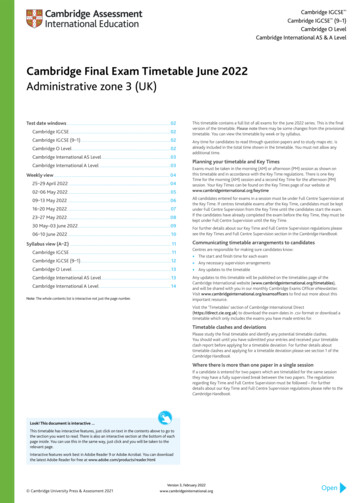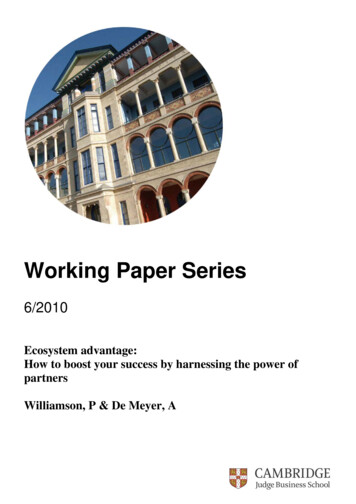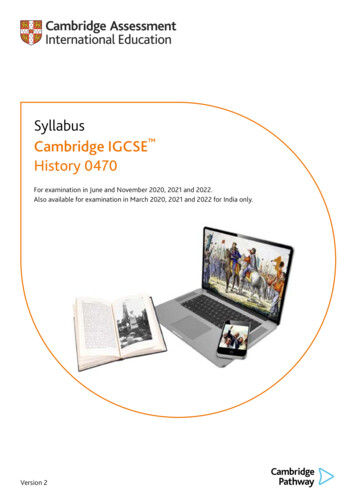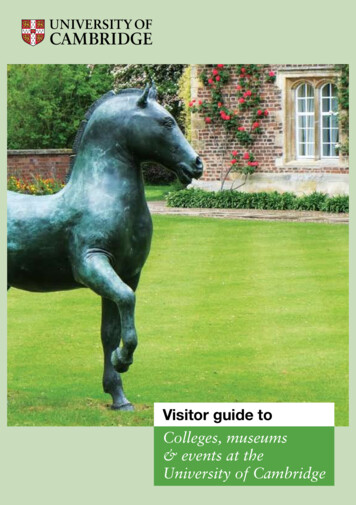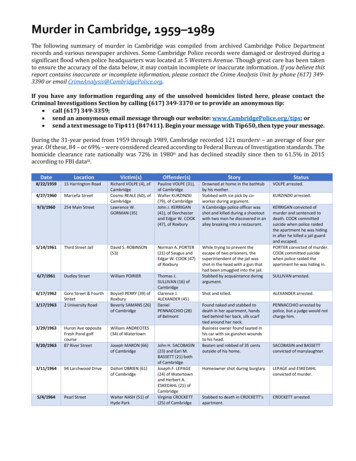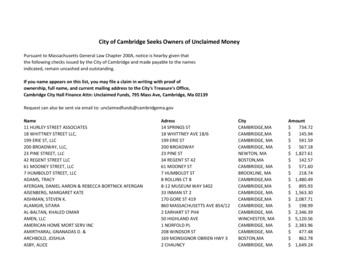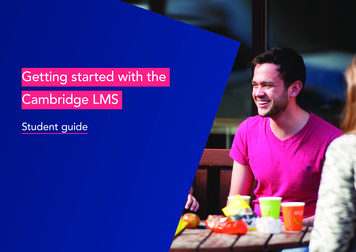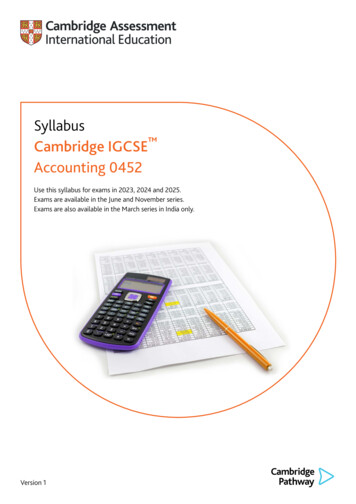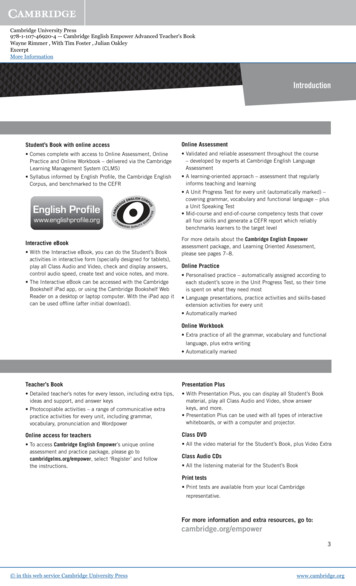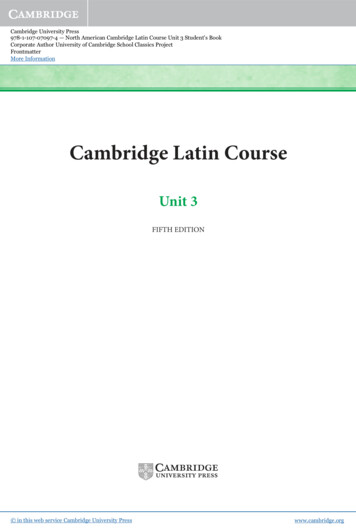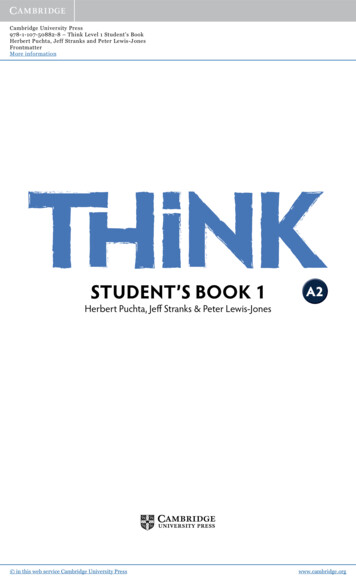
Transcription
Cambridge University Press978-1-107-50882-8 – Think Level 1 Student’s BookHerbert Puchta, Jeff Stranks and Peter Lewis-JonesFrontmatterMore informationSTUDENT’S BOOK 1Herbert Puchta, Jeff Stranks & Peter Lewis-Jones in this web service Cambridge University Presswww.cambridge.org
Cambridge University Press978-1-107-50882-8 – Think Level 1 Student’s BookHerbert Puchta, Jeff Stranks and Peter Lewis-JonesFrontmatterMore informationCONTENTSWelcome p 4 A Personal information; Nationalities and be; Names and addresses B Things in the classroom; Prepositions of place;Classroom language; Object pronouns; this / that / these / those C Days and dates; My day D My possessions; have got; I like and I’d likeFUNCTIONS & SPEAKING GRAMMARVOCABULARYUnit 1Having funTalking about routines and everydayactivitiesExpressing likes and dislikesGiving warnings and stating prohibitionPresent simple reviewlike -ingAdverbs of frequencyHobbiesWordWise: Collocationswith haveUnit 2Money and how tospend itRole play: Buying things in a shopTalking about what people are doing atthe momentPresent continuousVerbs of perceptionPresent simple vs. present continuousShopsClothesCountable and uncountable nounsa/an, some, anyHow much / many, a lot of / lots oftoo and (not) enoughFood and drinkAdjectives to talk about foodWordWise: Expressions withhave gotPossessive adjectives and pronounswhose and possessive ’swas / wereFamily membersFeelingsPast simple (regular verbs)Modifiers: quite, very, reallyParts of a house and furnitureAdjectives with -ed / -ingWordWise: Phrasal verbswith lookPast simple (irregular verbs)Double genitivePast simple questionsPast time expressionsPersonality adjectiveshave to / don’t have toshould / shouldn’tmustn’t vs. don’t have toGadgetsHouseworkWordWise: Expressionswith likePast continuousPast continuous vs. past simplewhen and whileSport and sports verbsAdverbs of sequenceComparative adjectivesSuperlative adjectivescan / can’t for abilityGeographical featuresThe weatherWordWise: Phrases with withbe going to for intentionsPresent continuous for arrangementsAdverbsPlaces in a townThings in town: compoundnounswill / won’t for future predictionsFirst conditionalTime clauses with when / as soon asParts of the bodywhen and ifWordWise: Expressions withdoPresent perfect simplePresent perfect with ever / neverPresent perfect vs. past simpleTransport and travelTravel verbsp 12p 20Review Units 1 & 2 pages 28–29Talking about foodUnit 3Ordering a mealFood for lifep 30ApologisingUnit 4Family tiesTalking about familiesAsking for permissionp 38Review Units 3 & 4 pages 46–47Talking about events in the pastUnit 5Making suggestionsIt feels like homep 48Role play: Buying furniture for youryouth clubUnit 6Best friendsSaying what you like doing alone andwith othersTalking about past eventsTalking about friends and friendshipsp 56Review Units 5 & 6 pages 64–65Giving adviceUnit 7Talking about rulesThe easy lifep 66Asking for repetition and clarificationRole play: A phone callUnit 8Sporting momentsTalking about sportsTalking about feelingsp 74Review Units 7 & 8 pages 82–83Talking about the weatherUnit 9The wonders of the Paying complimentsworldp 84Unit 10Around townp 92Talking about plansInviting and making arrangementsDiscussing ideas for an imaginary filmReview Units 9 & 10 pages 100–101Role play: A health problemUnit 11Making predictionsFuture bodiesp 102SympathisingUnit 12Travellers’ talesTalking about travel and transportTalking about life experiencesRole play: Life as a bus driver / flightattendantp 110Review Units 11 & 12 pages 118–1192Pronunciation pages 120–121Get it right! pages 122–126 in this web service Cambridge University PressSpeaking activities pages 127–128www.cambridge.org
Cambridge University Press978-1-107-50882-8 – Think Level 1 Student’s BookHerbert Puchta, Jeff Stranks and Peter Lewis-JonesFrontmatterMore informationPRONUNCIATIONTHINKSKILLS/s/, /z/, /ɪz/ soundsValues: Taking care of yourselfSelf esteem: Why it’s good to have a hobbyReading Quiz: Do you take good care of yourself?Blog: So what do you do in your free time?Photostory: Olivia’s new hobbyWriting Writing about routinesListening Conversations about hobbiesContractionsValues: Fashion and clothesTrain to Think: Exploring numbersReading Soap opera: ShoppingWebchat: How not to spend moneyCulture: World marketsWriting An informal email to say what you’re doingListening Shop dialoguesVowel sounds: /ɪ/ and /iː/Values: Food and healthSelf esteem: Being happyReading Article: Food facts or food fiction?Blog: My brother’s cookingPhotostory: The picnicWriting A paragraph about your favourite or least favourite mealListening Ordering food in a café-er /ə/ at the end of wordsValues: TV familiesTrain to Think: Making inferencesReading Article: TV FamiliesArticle: The swimming pool heroesCulture: Around the world on Children’s DayWriting An invitationListening Why my family drive me mad-ed endings /d/, /t/, /ɪd/Values: Community spiritSelf esteem: Feeling safeReading Article: The Lego HouseBlog: Dad gets it right! (finally)Photostory: Hey, look at that guy!Writing A blog post and a summary of a textListening What is home?Stressed syllables in wordsValues: Friendship and loyaltyTrain to Think: Making decisionsReading Article: TogetherArticle: How we metCulture: Friendship mythsWriting An apologyListening A story about Cristiano RonaldoVowel sounds: /ʊ/ and /uː/Values: Caring for people and the environmentSelf esteem: Classroom rulesReading Article: Just because I didn’t want to take a bathWebsite: Product reviewsPhotostory: The treasure huntWriting A paragraph about houseworkListening Radio programme – advice for young inventorsStrong and weak forms of wasand wereValues: Trying, winning and losingTrain to Think: SequencingReading Article: If you don’t give up, you can’t failWeb forum: Your favourite sports fails!Culture: The Olympic Games – the good and the notso-goodWriting An article about a sporting eventListening Teens talking about sportVowel sounds: /ɪ/ and /aɪ/Values: Valuing our worldSelf esteem: Being brave is Reading Article: An amazing placeArticle: Could you live there?Photostory: The competitionWriting An email about a place in the articleListening Interview with a Kalahari bushmanVoiced /ð/ and unvoiced /θ/consonantsValues: Appreciating other culturesTrain to Think: Problem solvingReading Blogs: Alice’s world, The life of BrianLetters to a newspaper: Our town: what’s wrong andwhat can we do about it?Culture: Ghost towns around the worldWriting An informal emailListening A conversation between people arranging to go outThe /h/ consonant soundValues: Exercise and healthSelf esteem: Getting helpReading Article: Changing bodiesWebchats: Crazy things that parents say to their kidsPhotostory: The phone callWriting A phone messageListening Dialogues about physical problemsSentence stressValues: Travel broadens the mindTrain to Think: Exploring differencesReading Blog: The non-stop travellerInterview: The taxi driverCulture: Hard journeys for schoolchildrenWriting An essay about someone you admireListening A traveller talking to children at his old school3 in this web service Cambridge University Presswww.cambridge.org
Cambridge University Press978-1-107-50882-8 – Think Level 1 Student’s BookHerbert Puchta, Jeff Stranks and Peter Lewis-JonesFrontmatterMore informationWELCOMEA ALL ABOUT MEPersonal informationNationalities and be4 Complete the names of the countries (add theconsonants).a11Put the dialogue in order. Number theboxes. Listen and check.eai ai21.0212iHi. I’m Alex.ALEXI’m fourteen. How about you?ALEXThe United States.ALEXHello, Fabiola. Where are you from?ABIOLA Me? I’m fourteen, too.FABIOLA I’m from Italy. And you?FABIOLA Hi, Alex. My name’s Fabiola.FABIOLA Cool! How old are you, Alex?ALEX3thea5Ieer-a4oo6eiiao1.03 Complete the dialogue with thephrases in the list. Listen and check.are meet this tooFabiola – 1is my friend Ravi.2RAVIHi, Fabiola. Nice toyou.FABIOLA Nice to meet you, 3, Ravi.And this is my friend: her name’s Patrizia.PATRIZIA Hi, guys. How 4you? I’m Patrizia.Patrizia Lambertucci.ALEX3SPEAKING Imagine you are a famous person.Work in pairs, then groups.127uia9ueai810 the UTell your partner who you are.Introduce your partner to others in the group.aieeHi, I’m Ryan Gosling.Hello, my name’s Rihanna. Andthis is my friend, Barack Obama.11Aeia 12eiu4 in this web service Cambridge University Presswww.cambridge.org
Cambridge University Press978-1-107-50882-8 – Think Level 1 Student’s BookHerbert Puchta, Jeff Stranks and Peter Lewis-JonesFrontmatterMore informationWELCOM ECarlos0SandraHe’s Brazilian.1Liam and JaneShe’sNatasha and Anna23Ricardo4BurcuLotte5Giovanni67Names and addresses7AndreaRaul and Luis8Ravi phones for a taxi. Listen andcomplete the information.1.059COOPER’S TAXIS5 What nationality are the people? Write theBooking formsentences.6Complete the dialogue using thecorrect forms of the verb to be. Then listen RIZIASo, Ravi – where 0 areyou from?1Me? Ifrom Britain. Alex here2from the United States, but I3British.4But,your name British?Oh, good question. Well, no it 5.My parents 6from India and somy name 7from India too. But mysister Anita and I were both born here,so we 8100% British.That 9cool. I think your name10really nice.Thank you! And you two, 11youboth Italian?That 12right. But we 13not from the same city. I 14fromMilan and Fabiola 15from Bari.We 16students at the languageschool here.8Taxi for1Going to2Pick up at3From4Number ofpassengers5Mr Chaudry1.06 Now listen to a phone call. Correct eachof these sentences.0Alex phones Patrizia.No – Patrizia phones Alex.They met last Wednesday.There’s a party at Patrizia’s place next Friday.3 The party starts at seven thirty.4 Patrizia lives at 134 Markam Avenue.5 Her phone number is 0788 224 234.125 in this web service Cambridge University Presswww.cambridge.org
Well, no it 5. My parents 6 from India and so my name 7 from India too. But my sister Anita and I were both born here, so we 8 100% British. FABIOLA Th at 9 cool. I think your name 10 really nice. RAVI Th ank you! And you two, 11 you both Italian? PATRIZIA Th at 12 right. But we 13 not from
